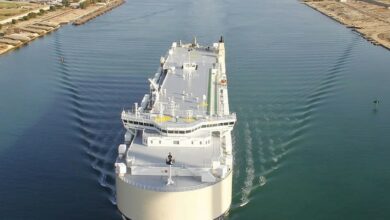Moscow–In an effort to avoid passage through the Suez Canal, a Russian gas tanker has succeeded in breaking through the ice of the Arctic Ocean and delivering its shipment to the Chinese city Shanghai.
The Baltica tanker, carrying 70,000 tons of gas, sailed 2500 nautical miles (4630 kilometers) in 11 days, escorted by the Russian nuclear-powered icebreaker 50 Years of Victory. The Baltica captain reportedly said the journey was “smooth and trouble free.”
The success will lead to future transports through the Arctic, according to an announcement by the tankers’ owner Novatec. The company also noted that Russia will soon complete its much anticipated liquefied natural (LNG) gas plant in the northern coastal district of Yamal. The new passage will allow easy transport for the LNG produced in Yamal to East Asian destinations.
Experts say the Arctic route significantly shortens the distance between Europe and East Asia and will surely affect international trading routes. From Europe to Japan, via the northern passage, is around 13,000 kilometers, as opposed to the nearly 20,500 kilometers ships must travel through the Suez and onward. The Arctic route also saves 10 days and US$300,000.
Russia will profit from both the passage fees of the new route and the services it would provide ships during the journey, experts say. However, experts also argued this route would be economically infeasible unless it passes a minimum of 30 million tons of cargo annually.
The route will also encourage forays into the North Pole’s natural resource repositories. The North Pole holds 25 percent of the world’s gas and oil reserves, experts say.
“Global warming would facilitate this new route by 2030,” said former Suez Canal Authority board member Wael Qadour. “This would definitely affect the Suez Canal.”
But a Suez Canal Authority official, in contradiction with the evidence offered by the transportation experts, said the new route will only benefit Russia and China. The Suez will remain a vital transportation artery, the official said.




